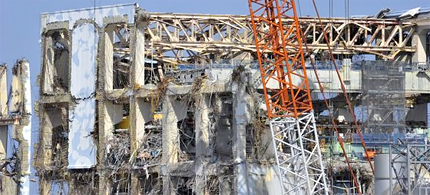 The Fourth Reactor at Fukushima on February 20, 2012. The yellow area is the containment vessel. (photo: The Asahi Shimbum Digital)
The Fourth Reactor at Fukushima on February 20, 2012. The yellow area is the containment vessel. (photo: The Asahi Shimbum Digital)
by Roberta Rampton, Reuters - readersupportednews.org - April 17, 2012
Japan, with assistance from the U.S. government, needs to do more to move spent fuel rods out of harm's way at the tsunami-stricken Fukushima Daiichi nuclear plant, said U.S. Senator Ron Wyden on Monday.
Wyden, a senior Democratic senator on the Senate Energy committee, toured the ruined Fukushima plant on April 6, and said the damage was far worse than he expected.
"Seeing the extent of the disaster first-hand during my visit conveyed the magnitude of this tragedy and the continuing risks and challenges in a way that news accounts cannot," said Wyden in a letter to Ichiro Fujisaki, Japan's ambassador to the United States.
Last March, an earthquake followed by a tsunami wrecked the Fukushima plant, causing the world's worst nuclear accident in 25 years and prompting global scrutiny of the safety of nuclear power plants.
Recent Comments